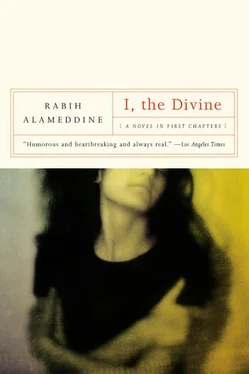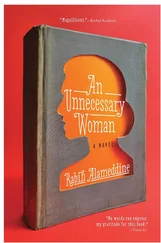“You burned a hole in your coat,” she says, not an expression of concern, but a conversation starter.
“I know. I dropped a cigarette.”
“They don’t warn you about the sartorial dangers of smoking.”
He hangs his coat on the coathook, takes off one sweater, the scarf, the hat, gradually regains his natural form. He takes off his boots. He comes over and lies on the couch, his head on her lap, his legs draped over the armrest. She strokes his hair gently.
“Did you lose a mitten?” she asks.
“ Mitten ?” She had used the English word. “What is mitten?”
“It means a glove without fingers.”
“I know what it means. I know exactly what it means. Why do they use a different word? Why did you use it?”
“Because a mitten is different from a glove and you lost a mitten. That’s why.”
“Couldn’t you have used the Lebanese word? I mean when did we start differentiating between a mitten and a glove.”
“It’s just more precise.”
“Precise. Yes.”
He stares at the ceiling as she continues to stroke his hair.

Régine and Fatima giggled, huddling together on the couch, arms entwined. Janet stood in front of a floor-length mirror dubious of the reflection. She liked the kohl. Not the rest, though. The braided hair made her look prepubescent. The gold chain with dangling trinkets around her forehead, the yellow eye shadow and the blood-red lipstick had the opposite effect, made her look adult, in her thirties. The dichotomy was disconcerting. She did not look Lebanese, yet was no longer American. She knew no Lebanese woman who dressed like that. She stared at the girl in the mirror. She appeared so exotic, straight out of a Sinbad Hollywood movie. Yes. Sin and bad. That was the girl in the mirror. She shuddered. She thought she was losing her footing again, though her feet had not budged. She quickly grabbed the mirror to steady herself. She looked like something out of A Thousand and One Nights . She was Shahrazad, a drunk Shahrazad, spinning tales.
“Do you like it?” Régine asked her Galatea.
“It’s strange,” Janet responded, which induced another bout of tittering from her friends. “I look so different.”
Fatima fixed herself another drink. Her parents were in the mountains for the weekend so she had no worries. She placed a single ice cube in the miniature glass, poured the glass jar of arak until the glass was half full. The clear liquid whitened as it hit the cube, turning milky when she topped the glass with water.
“To your health,” she said to no one in particular as she lifted the glass in the air, then gulped down the whole drink.
“You didn’t make me one,” Régine pouted.
“Sorry. I’ll do it. Do you want another, Janet?”
Janet was entranced. “Mirror, mirror, on the wall, who’s the fairest of them all?” Janet heard, “I am,” coming from behind her, but was unsure whether it was Régine or Fatima. She begged to differ. There was no doubt Janet was the most beautiful of the three. How many times had she seen her face in the mirror? She knew every minute detail of it. Yet what stared back at her was a face she did not recognize. She raised the corners of her mouth for a smile, attempting to recapture some glimmer of familiarity. The face staring back at her became more distorted. She shivered perceptibly.
“You don’t like it?” Régine asked, supine on the couch. Fatima was making more drinks. “Isn’t that what you wanted?”
“I don’t know. I wanted to look Lebanese so that I don’t look so different from everybody.”
Why was she here if not to feel different from the way she did back there? She wanted to experience the world. She wanted to change how the world saw her. Then why was she so terrified of the transformation she saw? She stared at the reflection. She must force herself to like this amalgam of East and West, to embrace it. The reflection might not be the new her, but she should accept any discernible change, no matter how incongruous it appeared. Any change was good change.
“Pour me a drink, Fatima,” she said.
“You’re so remarkable,” Fatima said. “I can’t believe you like arak. I bet you no other American would drink this.”
“I want to celebrate the new me.”
Janet kept looking at the mirror. She saw looking back at her a middle-aged woman, sad, lonely, desperate. She saw someone bitter. The woman in the mirror shook her head and told her, “Don’t.” The phrase repeated in her head over and over, a ringing. She was terrified. She covered her ears with her hands, felt faint.
On the corner of Bliss and Abdel-Nour streets, Janet waited for Régine and Fatima, looking in a store’s picture window. Nothing interesting so she regarded her insubstantial reflection. She looked good. Janet had an abundance of bright red hair and was well aware of it. She took out a cigarette as a group of young university men walked by.
“Hi, Janet,” one of the boys said.
She glanced up at him, unsure whether she knew him. She smiled anyway. “Hi there.” The young man puffed up, obviously proud he knew her. One of the boys hesitated, wondering whether they were going to slow down and talk to her. The group kept moving. She lit her cigarette. Looking back, the young man said, “I’ll see you in class tomorrow.” Ah, he was in her math class. Could not remember his name, though. She heard them talking. Those eyes were the only thing she understood. She grinned. She should learn more Arabic. One of the boys punched her classmate on the shoulder and they disappeared around a corner.
Her eyes kept reverting back to a sprig of grass between the sidewalk slabs. It looked out of place. She wanted to pick it since she felt some strange affinity to it. Just as she was about to bend down, she heard Régine calling.
As usual Régine showed up first. Fatima was habitually late. Régine was dressed to the nines, en tailleur Chanel as the Lebanese would say, which surprised Janet. She assumed Régine wanted to look older to impress the woman. Maybe Régine was not as confident as she appeared.
“Are you ready?” Régine asked, stepping partly toward Janet. She searched through her handbag, stood feet slightly apart, her weight unbalanced.
“Yes, sure. Are you?”
“Yes, of course. Done this lots of times.” She lit a Marlboro, her hands trembling slightly, exhaled loudly.
“I don’t believe in the stuff anyway.”
“You’ll see. She’s good.”
When the dark-red Rambler stopped in front of the girls, Régine quickly threw the cigarette on the ground and stamped it out. Fatima got out of her father’s car. Régine had to stoop, look through the car’s passenger window, to greet Fatima’s father.
The girls waited until the car turned the corner before all three of them opened their purses and took out cigarettes. Régine flagged a taxi. When Janet looked down, she noticed the sprig of grass had been sheared by Régine’s high-heel.
The fortune-teller’s house was in Zi’a’ el-Blatt, a neighborhood Janet had never been to. Like other houses on the street, it was old, Lebanese old. Régine knocked on the oversized door and the girls waited. And waited. Janet noticed the ubiquitous turquoise hand, palm outward, dangling from a chain at the top of the door. After a while a woman opened the door.
“We’re looking for Sitt Noha,” Régine said.
“Well, you found her. Come on in, girls.” Her manner was not cheerful, nor crude, neither welcoming nor antagonistic. However, Janet knew Régine and Fatima would already feel slighted. The fortune-teller had not shown enough respect.
Читать дальше













